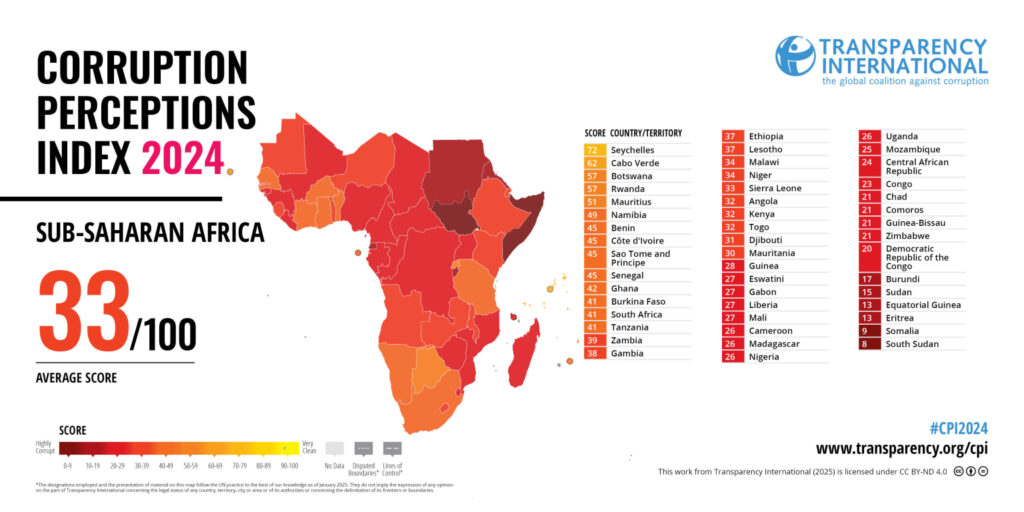january 11, 2025
In 2024, the Sub-Saharan African region once again registered the lowest average score on the Corruption Perceptions Index (CPI), at just 33 out of 100, with 90 per cent of countries scoring below 50. Yet amid this very low annual performance, there were African countries that invested in anti-corruption and made remarkable progress.
How do countries measure up on corruption in the public sector?
The region’s highest scorers include Seychelles (CPI score: 72), Cabo Verde (62), Botswana (57) and Rwanda (57). The lowest scorers declined further on this year’s CPI: Equatorial Guinea (13), Eritrea (13), Somalia (9) and South Sudan (8).
Regional overview
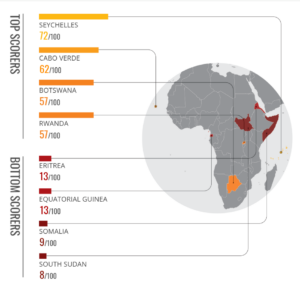
Stronger justice
In recent years, several African nations have shown noteworthy improvements in their efforts to combat corruption and enhance transparency.
Cote d’Ivoire (45) consolidated its progress, gaining 10 points in total since 2019. The country’s success can be attributed to a number of legal and institutional reforms implemented by the administration of President Alassane Ouattara to promote transparency and accountability and strengthen the fight against economic and financial crime.
Seychelles (72) – the continent’s top performer and the country with the biggest increase globally – has improved by 20 points since 2012. The state has been actively prosecuting high-profile corruption cases and has taken steps to improve beneficial ownership transparency and strengthen information exchange among relevant law enforcement institutions. As a result, Seychelles fulfilled all requirements to move off the EU blacklist for noncompliance with international financial transparency standards.
Tanzania (41) has gained 10 points since 2014, as corrupt officials finally faced consequences for their actions. Over the last decade, it has become widespread practice for high-level public officials suspected of corruption to be immediately relieved of their duties, with law enforcement launching investigations. The country has also established a specialised court committed to the prosecution of corruption and economic crime.
Significant Improvers
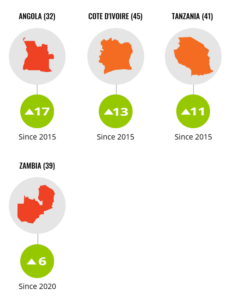
Over the last decade, Lesotho (37) has dropped 12 points, as the government has cracked down on civil society and silenced journalists. In 2023, activists attempted to peacefully protest against the Polihali Dam project for its negative impacts on the community, but the Lesotho Defense Force confiscated protesters’ placards and forcefully shut down the protest. Coupled with an opaque appointment process for judges and a high backlog of cases that has called into question the judiciary’s efficacy, this has made fighting corruption particularly difficult.
Neighbouring Eswatini (27) has also declined significantly, by 16 points during the past decade. A February report by the Public Accounts Committee showed numerous unauthorised expenditures in the national budget by various ministries – and no response from the Anti-Corruption Commission.
Gabon (27) and Liberia (27) have both recorded 10-point declines since 2014, but recent developments in the two countries give reason for hope. A 2023 coup ended 56 years of single-family rule in Gabon, and the transitional president, Brice Oligui Nugema, has committed to anti-corruption efforts, including reinstating the Commission on Public Procurement Processes, after audits revealed overcharging. Liberian President Joseph Boakai, who took office in January 2024, provided a public assets declaration and initiated audits of key state institutions, including the central bank, offering hope for the future.
Significant decliners
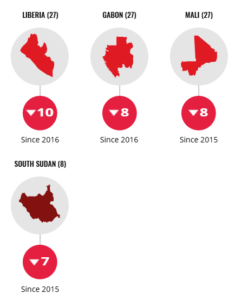
As flood waters devastate landscapes and communities across Africa, from Senegal (45) to Tanzania (41), climate change’s impact on the continent is undeniable. It is estimated that for every two degrees Celsius of warming, Africa loses about five per cent of its GDP. In response, African countries require an estimated US$2.8 trillion in financing to enact their “Nationally Determined Contributions” under UN frameworks to combat climate change. Yet such funding currently falls far short – and that which is provided is significantly undermined by corruption.
South Africa (41) shows a worrying trend, dropping by three points on the CPI since 2019. In 2025, the country will host the G20 Leaders’ Summit, giving it a vital opportunity to advocate for increased climate finance commitments from G20 countries, that do not conflate debt repayments, private financing and loans as a substitute for direct mechanisms to mitigate the climate crisis. The country must strengthen oversight mechanisms, to ensure that corruption in host countries does not interfere with such crucial international processes, as has happened at past summits.

This requirement extends beyond just one host country. At COP29, rich countries committed to providing US$300 billion annually by 2035 for vulnerable countries to combat climate change, meaning more climate finance should quickly pour into the African continent. This will require robust anti-corruption systems to ensure these funds support the people and the natural world – rather than corrupt elites. This is particularly important given that from 2013 to 2017, between US$24 billion and US$41 billion of climate finance from the World Bank project portfolio was unaccounted for.
Strengthening anti-corruption systems is therefore a critical investment to ensure Africa’s people can withstand climate change and secure the socio-economic opportunities needed to build a better future.
Paul Banoba, Robert Mwanyumba and Samuel Kaninda, Regional Advisors for Africa, Transparency International
